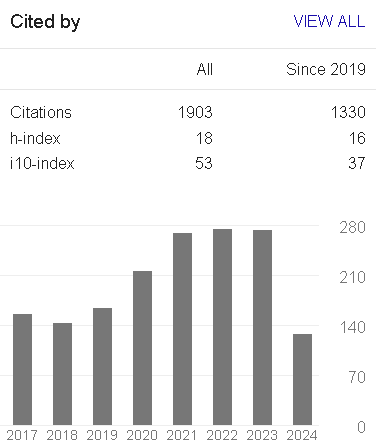Sentiment Analysis of Feedback Information in Hospitality Industry
Keywords:
Sentiment Analysis, Opinion Mining, Naive Bayes classifiers, Language models, Features, AnnotationAbstract
Sentiment analysis is the study of opinions, emotions of a person‟s towards events or entities which can enable to rate that event or entity for decision making by the prospective buyers/users. In this research paper I have tried to demonstrate the use of automatic opinion mining/sentiment analysis to rate a hotel and its service‟s based on the guest feedback data. We have used a semantic resource for a feature vector and Naïve Bayes classifier for the review classification after reducing the feature sets for better accuracy and efficiency. Also an improvement in the accuracy of the classification has been observed after the use of bi-gram and tri-gram language model.
References
B.Liu, "Sentiment Analysis and Subjectivity, Handbok of Natural Language Processesing ". Second Edition( editors: N. Indurkhya and F. J. Damerau), 2010
B. Pang and L. Lee, "Opinion Mining and Sentiment Analysis ". Foundation and Trends in Information Retrieval 2(1-2), pp. 1-35, 2008.
J. Wiebe, T. Wilson, R. Bruce and M. Martin, "Learning Subjective Language”, Computational Linguistics, Vol 30, pp 277-308, September 2004.
M. Hu and B. Liu, “Mining and Summarizing Customer Reviews”,Proceedings of the ACM SIGKDD Conference on Knowledge Discovery and Data Mining, pp, 168-177,2004.
Michael Gamon, “ Sentiment classification on customer feedback data : noisy data, large feature vectors and the role of linguistic analysis”, Proceeding of COLING-04, the 20th International Conference on Computational Linguistics, pp 841-847 , Geneva, CH
Jeonghee Yi, Tetsuya Nasukawa, Razvan Bunescu, and Wayne Niblack,”Sentiment Analyzer: Extracting Sentiments about a Given Topic using Natural Language Processing Techniques”, Proceeding of ICDM-03, the 3ird IEEE International Conference on Data Mining pp 427-434, Melbourne, US
Forman, G. 2003. An extensive empirical study of feature selection metrics for text classification. J. Mach. Learn. Res. 3 (Mar. 2003), 1289-1305.
Dave, K., Lawrence, S., and Pennock, D.M. 2003. Mining the peanut gallery: Opinion extraction and semantic classification of product reviews. WWW 2003
Pang, Bo, and Lillian Lee. "Opinion mining and sentiment analysis." Foundations and trends in information retrieval 2.1-2 (2008): 1-135.
Rennie, Jason D., et al. "Tackling the poor assumptions of naive bayes text classifi-ers."Machine learning international workshop and
conference Vol. 20. No. 2. 2003
Andrew L. Maas, Raymond E. Daly, Peter T. Pham, DanHuang, Andrew Y. Ng, and Christopher Potts. (2011). Learning Word Vectors for Sentiment Analysis. The 49th An-nual Meeting of the Association for Computational Linguistics (ACL 2011).
Kennedy, Alistair, and Diana Inkpen. "Sentiment classification of movie reviews using contextual valence shifters."Computational Intelligence22.2 (2006): 110-125.
Aidan Finn and Nicholas Kushmerick (2003): „Learning to classify documents according to genre“. IJCAI-03 Workshop on Computational Approaches to Text Style and Synthesis.
Li, Tao, Yi Zhang, and Vikas Sindhwani. "A non-negative matrix tri-factorization approach to sentiment classification with lexical prior knowledge."Proceedings of the Joint Conference of the 47th Annual Meeting of the ACL and the 4th International Joint Conference on Natural Language Processing of the AFNLP: Volume 1-Volume 1. Associationfor Computational Linguistics, 2009.
Matsumoto, S., Takamura, H., & Okumura, M. (2005). Sentiment classification using word sub-sequences and dependency sub-trees.
In PAKDD 2005 (pp. 301–311).Springer-Verlag: Berlin, Heidelberg.
Whitelaw, Casey, Navendu Garg, and Shlomo Argamon."Using appraisal groups for sentiment analysis." Proceedings of the 14th
ACM international conference on Information and knowledge management. ACM, 2005.
Peter D. Turney (2002): “Thumbs up or thumbs down? Semantic orientation applied to unsupervised classification of reviews”. In: Proceedings of ACL 2002, pp. 417-424
Downloads
Published
How to Cite
Issue
Section
License
Copyright (c) 2014 COMPUSOFT: An International Journal of Advanced Computer Technology

This work is licensed under a Creative Commons Attribution 4.0 International License.
©2023. COMPUSOFT: AN INTERNATIONAL OF ADVANCED COMPUTER TECHNOLOGY by COMPUSOFT PUBLICATION is licensed under a Creative Commons Attribution 4.0 International License. Based on a work at COMPUSOFT: AN INTERNATIONAL OF ADVANCED COMPUTER TECHNOLOGY. Permissions beyond the scope of this license may be available at Creative Commons Attribution 4.0 International Public License.


